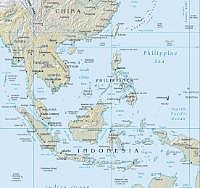TOKYO -- Last month the Indian Navy sunk what it believed to be a Somali pirate "mother ship" off the coast of Somalia. The vessel turned out to be a Thai trawler, but the intervention nevertheless highlighted an increasing willingness among Asian nations to take a lead in tackling the growing piracy problem that has garnered worldwide attention and alarm. Notwithstanding the Indian misstep, the results so far are impressive. While the number of attacks off the coast of Africa, including the Gulf of Aden, has jumped about 75 percent this year, Asia's Malacca Straits had experienced just two attacks through September, compared with 70 in 2000, according to the International Maritime Bureau. "The No. 1 reason is state-to-state cooperation," says Lim Tai Wei , research fellow at the East Asian Institute, National University of Singapore. The clearest example has been the Regional Cooperation Agreement on Combating Piracy and Armed Robbery Against Ships in Asia (ReCAAP). The agreement, which includes an information-sharing center in Singapore, consists of Association of Southeast Asian Nations (ASEAN) members plus Japan, China, the Republic of Korea, India, Sri Lanka and Bangladesh.
Asia Tackles Piracy

